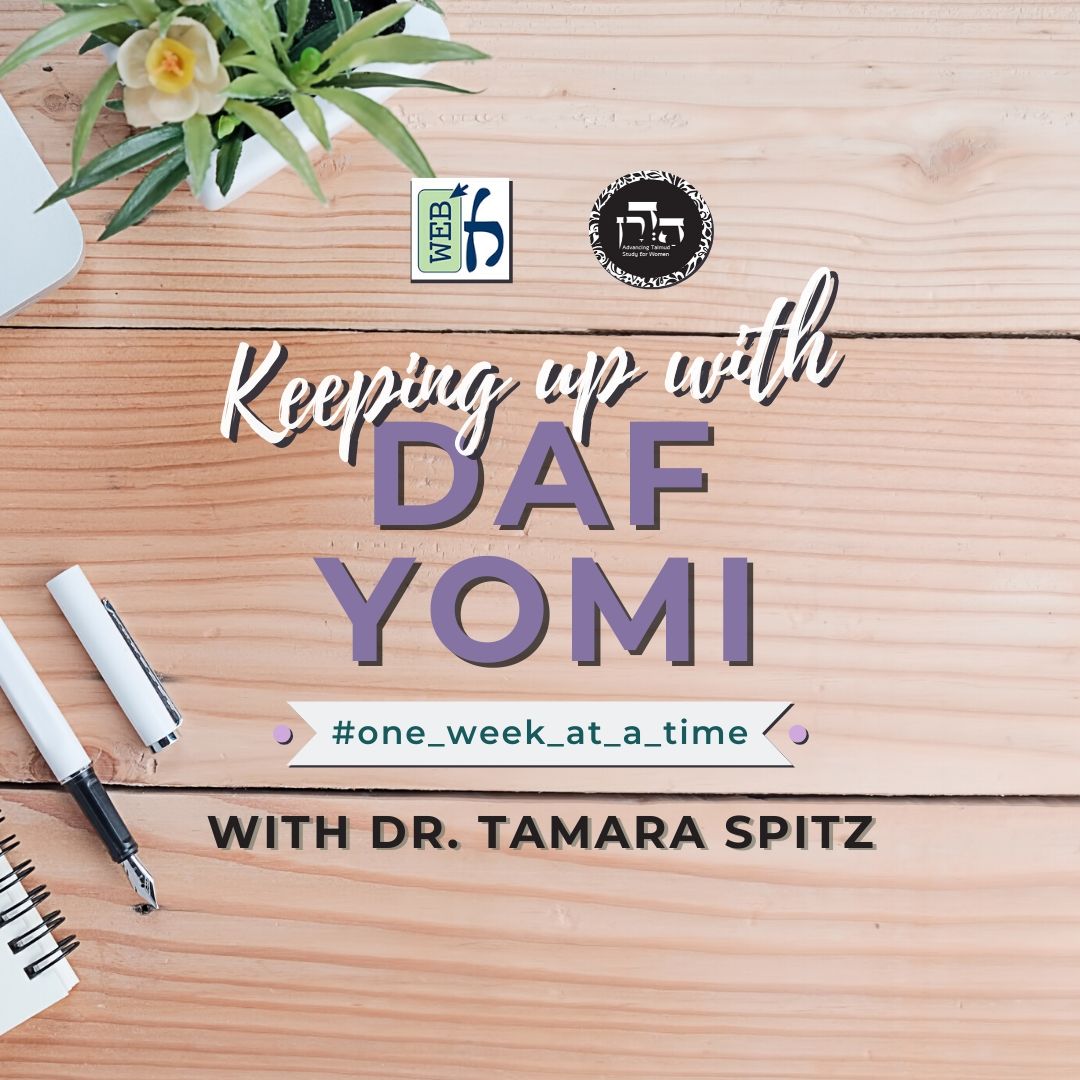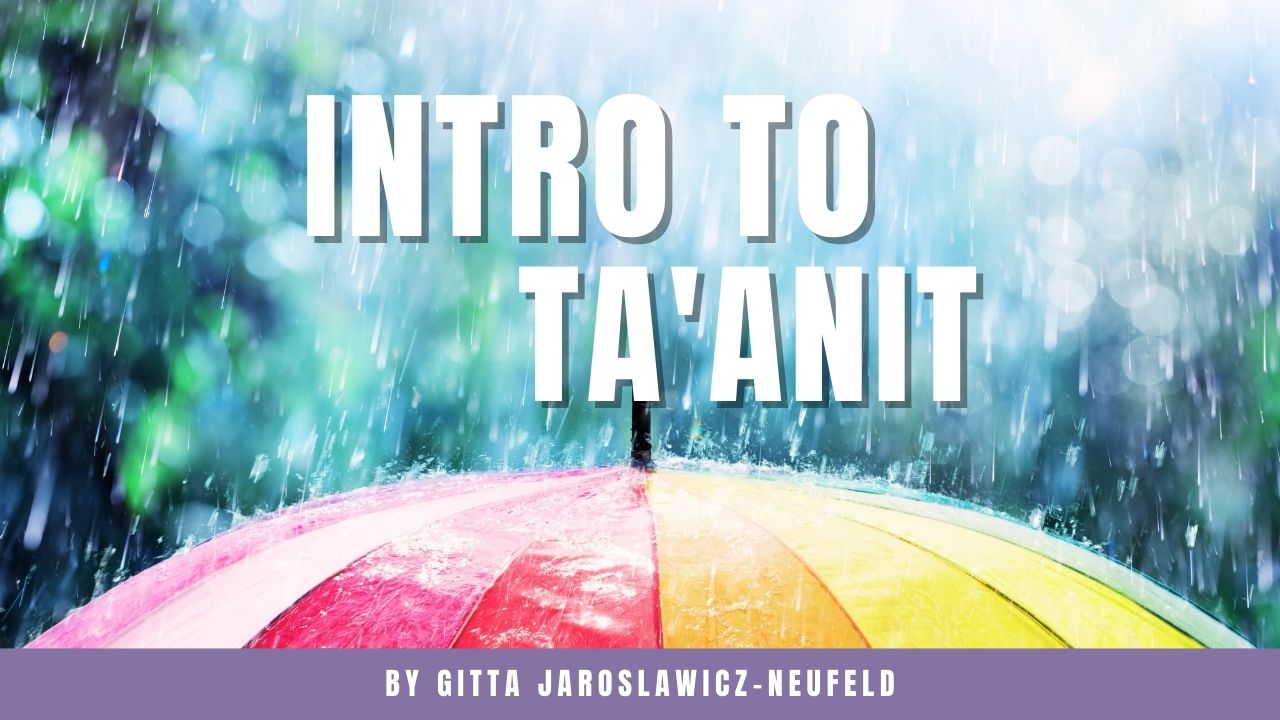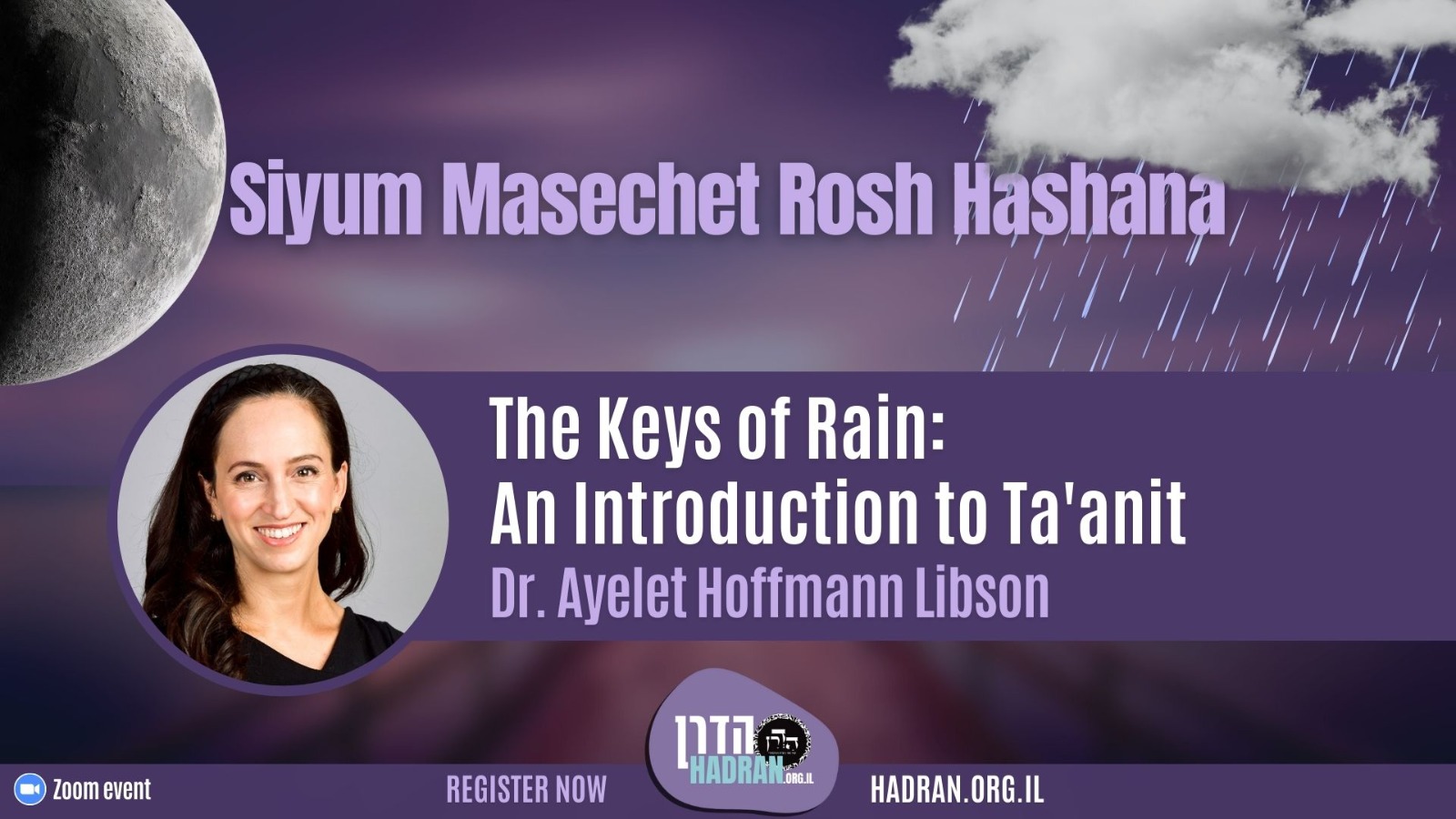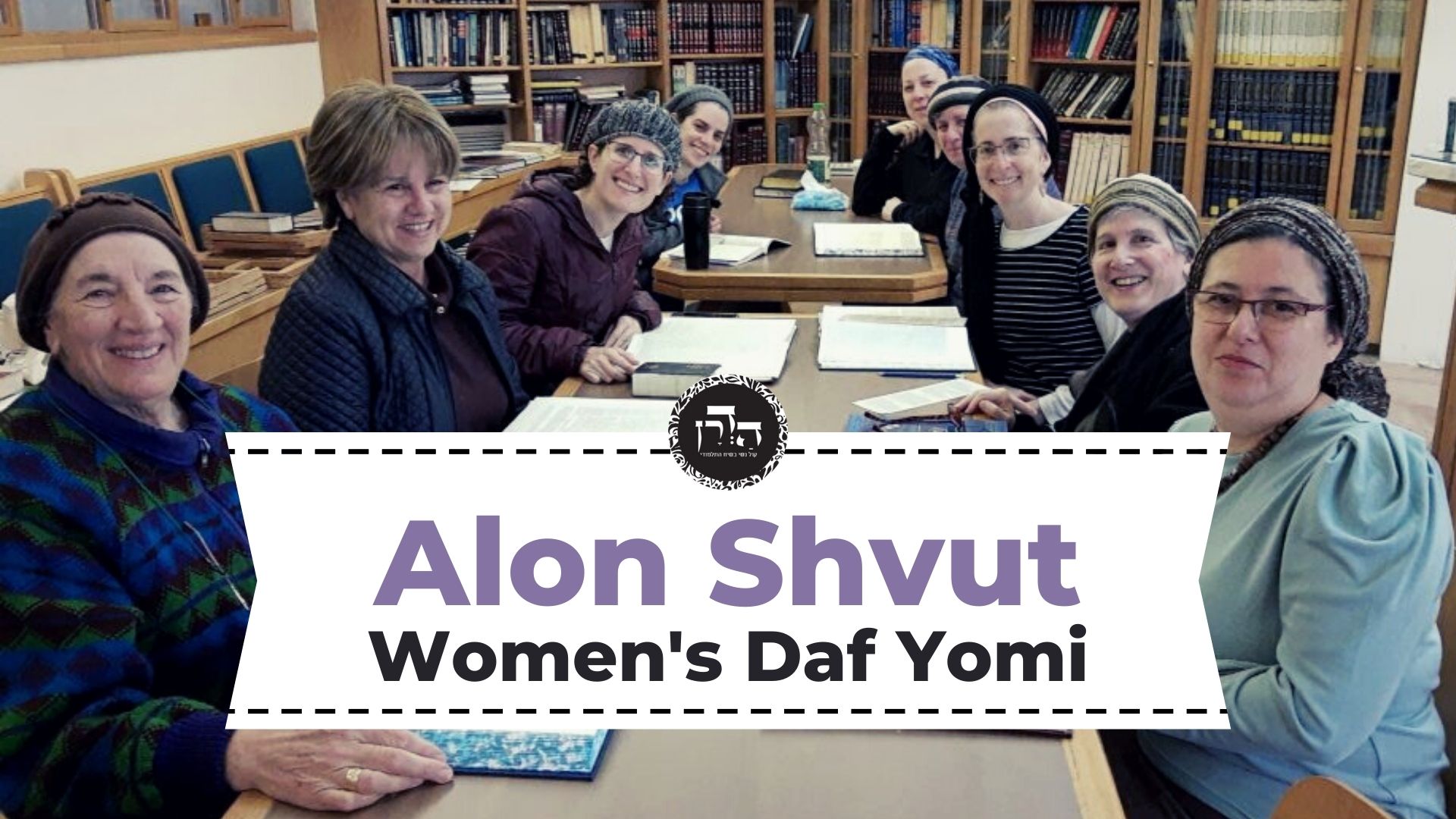Taanit 2
Share this shiur:
This month’s learning is dedicated to the refuah shleima of our dear friend, Phyllis Hecht, גיטל פעשא בת מאשה רחל by all her many friends who love and admire her. Phyllis’ emuna, strength, and positivity are an inspiration.
Want to dedicate learning? Get started here:




Summary
On what date do we begin to mention the strength of God who brings the rains “mashiv haruach u’morid hageshem” in our prayers? The Mishna brings two opinions. This is different from the day we ask God to bring the rain. The Gemara asks about the fact that the Mishna begins with the question from when without first talking about the concept of mentioning rains in our prayers. In response, they reply that the Mishna addressed an earlier topic in Masechet Berakhot but then since Berakhot is an entirely different seder of Mishna, they add that in Masechet Rosh Hashanah Tractate they mentioned the subject in the Mishnah “and on the Feast of Judgment on the Water.” Why in the Mishnah is it called “the strength of the rains”?” Where do we get that rains are strengths of God? The verses of the rains are connected to verses of the creation of the world where the strength of God is mentioned. There is a hint in the Torah that rains should be mentioned in prayer – derived from the verses in Shema that connected between prayer and the bringing of the rain. Rabbi Yochanan says that there are three keys that God keeps in his hand and are not given to an intermediary – rain, pregnancy/birth and the resurrection of the dead. Some also say livelihood. Rabbi Eliezer and Rabbi Yehoshua derive their opinions from the lulav – one says we begin the same day as lulav, one says when we finish the mitzva of lulav. Two other opinions derive it from the water libations and derive from the unique wording used in describing the libations on day number 2 and day number six of the holiday that one should begin on the second day or on the sixth day of Sukkot to praise God about bringing rain.
Today’s daily daf tools:
This month’s learning is dedicated to the refuah shleima of our dear friend, Phyllis Hecht, גיטל פעשא בת מאשה רחל by all her many friends who love and admire her. Phyllis’ emuna, strength, and positivity are an inspiration.
Today’s daily daf tools:
Delve Deeper
Broaden your understanding of the topics on this daf with classes and podcasts from top women Talmud scholars.
New to Talmud?
Check out our resources designed to help you navigate a page of Talmud – and study at the pace, level and style that fits you.
The Hadran Women’s Tapestry
Meet the diverse women learning Gemara at Hadran and hear their stories.
Taanit 2
מֵאֵימָתַי מַזְכִּירִין גְּבוּרוֹת גְּשָׁמִים? רַבִּי אֱלִיעֶזֶר אוֹמֵר: מִיּוֹם טוֹב הָרִאשׁוֹן שֶׁל חַג. רַבִּי יְהוֹשֻׁעַ אוֹמֵר: מִיּוֹם טוֹב הָאַחֲרוֹן שֶׁל חַג.
MISHNA: From when, i.e., from which date, does one begin to mention the might of the rains by inserting the phrase: He makes the wind blow and rain fall, in the second blessing of the Amida prayer? Rabbi Eliezer says: The phrase is inserted from the first Festival day of the festival of Sukkot. Rabbi Yehoshua says: From the last Festival day of the festival of Sukkot.
אָמַר לוֹ רַבִּי יְהוֹשֻׁעַ: הוֹאִיל וְאֵין הַגְּשָׁמִים אֶלָּא סִימַן קְלָלָה בֶּחָג, לָמָה הוּא מַזְכִּיר? אָמַר לוֹ רַבִּי אֱלִיעֶזֶר: אַף אֲנִי לֹא אָמַרְתִּי לִשְׁאוֹל אֶלָּא לְהַזְכִּיר ״מַשִּׁיב הָרוּחַ וּמוֹרִיד הַגֶּשֶׁם״ בְּעוֹנָתוֹ. אָמַר לוֹ: אִם כֵּן, לְעוֹלָם יְהֵא מַזְכִּיר!
Rabbi Yehoshua said to Rabbi Eliezer: Since rain is nothing other than a sign of a curse during the festival of Sukkot, as rainfall forces Jews to leave their sukkot, why should one mention the might of rain during this period? Rabbi Eliezer said to him: I too did not say that it is proper to request rain at this time, but it is proper only to mention the phrase: He makes the wind blow and rain fall, in its due time. Rabbi Yehoshua said to him: If so, i.e., if reciting the phrase does not constitute a request for rain, one should always mention rain, even in the summer.
אֵין שׁוֹאֲלִים אֶת הַגְּשָׁמִים אֶלָּא סָמוּךְ לַגְּשָׁמִים. רַבִּי יְהוּדָה אוֹמֵר: הָעוֹבֵר לִפְנֵי הַתֵּיבָה בְּיוֹם טוֹב הָאַחֲרוֹן שֶׁל חַג — הָאַחֲרוֹן מַזְכִּיר, הָרִאשׁוֹן אֵינוֹ מַזְכִּיר. בְּיוֹם טוֹב רִאשׁוֹן שֶׁל פֶּסַח — הָרִאשׁוֹן מַזְכִּיר, הָאַחֲרוֹן אֵינוֹ מַזְכִּיר.
The mishna states a general principle: One requests rain only immediately preceding the rainy season. Rabbi Yehuda says: With regard to the one who passes before the ark as prayer leader on the concluding Festival day of the festival of Sukkot, the Eighth Day of Assembly: The last prayer leader, who leads the additional prayer, mentions rain, whereas the first prayer leader, for the morning prayer, does not mention rain. The opposite is the case at the conclusion of the period for mentioning rain on the first Festival day of Passover: Here, the first prayer leader, who leads the morning prayer, mentions rain, while the last prayer leader, who leads the additional prayer, does not mention rain.
גְּמָ׳ תַּנָּא הֵיכָא קָאֵי דְּקָתָנֵי ״מֵאֵימָתַי״? תַּנָּא הָתָם קָאֵי —
GEMARA: The Gemara asks: Where does the tanna of the mishna stand, that he teaches: From when? The mishna’s opening question indicates that it has already been established that there is an obligation to mention rain at this time of the year. Where is this obligation stated? The Gemara answers: The tanna is standing there, i.e., he bases himself on a mishna in Berakhot.
דְּקָתָנֵי: מַזְכִּירִים גְּבוּרוֹת גְּשָׁמִים בִּתְחִיַּית הַמֵּתִים, וְשׁוֹאֲלִין בְּבִרְכַּת הַשָּׁנִים, וְהַבְדָּלָה בְּחוֹנֵן הַדָּעַת. וְקָתָנֵי: מֵאֵימָתַי מַזְכִּירִים גְּבוּרוֹת גְּשָׁמִים.
As it teaches (Berakhot 33a): One mentions the might of the rains and recites: He makes the wind blow and the rain fall in the second blessing of the Amida prayer, the blessing of the resurrection of the dead. And the request for rain: And grant dew and rain as a blessing, is recited in the ninth blessing of the Amida prayer, the blessing of the years. And the prayer of distinction [havdala] between the sacred and the profane, recited in the evening prayer following Shabbat and Festivals, is recited in the fourth blessing of the Amida prayer: Who graciously grants knowledge. And it is based on that mishna, which establishes the obligation to request for rain, that this mishna teaches: From when does one begin to mention the might of the rains.
וְלִיתְנֵי הָתָם! מַאי שְׁנָא דְּשַׁבְקֵיהּ עַד הָכָא?!
The Gemara asks: But if so, let the tanna teach this halakha there, in tractate Berakhot, at the beginning of the order of Zera’im. What is different about this case that he left it until here, toward the end of the order of Moed? In other words, if this issue is indeed a continuation of the mishna in Berakhot, why did the tanna neglect it until tractate Ta’anit?
אֶלָּא, תַּנָּא מֵרֹאשׁ הַשָּׁנָה סָלֵיק, דִּתְנַן: וּבֶחָג נִידּוֹנִין עַל הַמַּיִם. וְאַיְּידֵי דִּתְנָא וּבֶחָג נִידּוֹנִים עַל הַמַּיִם, תָּנָא מֵאֵימָתַי מַזְכִּירִין גְּבוּרוֹת גְּשָׁמִים.
The Gemara answers: Rather, the tanna interrupted a discussion from tractate Rosh HaShana. As we learned in a mishna there: And on the festival of Sukkot all creatures are judged for water. Since the tanna taught: And on the festival of Sukkot all creatures are judged for water, from which it can be inferred that one should request rain near the time of this judgment, he taught here: From when does one mention the might of the rains.
וְלִיתְנֵי ״מֵאֵימָתַי מַזְכִּירִים עַל הַגְּשָׁמִים״. מַאי ״גְּבוּרוֹת גְּשָׁמִים״? אָמַר רַבִּי יוֹחָנָן: מִפְּנֵי שֶׁיּוֹרְדִין בִּגְבוּרָה, שֶׁנֶּאֱמַר: ״עֹשֶׂה גְדֹלוֹת עַד אֵין חֵקֶר וְנִפְלָאוֹת עַד אֵין מִסְפָּר״, וּכְתִיב: ״הַנֹּתֵן מָטָר עַל פְּנֵי הָאָרֶץ וְשֹׁלֵחַ מַיִם עַל פְּנֵי חוּצוֹת״.
§ The Gemara asks a question with regard to the language of the mishna: And let the tanna simply teach: From when does one mention the rains. What is the meaning of the phrase: The might of the rains? Rabbi Yoḥanan said: Because the rains fall with might. The might of the rain displays God’s power in the world, as it is stated: “Who does great things beyond comprehension, marvels without number” (Job 5:9). And it is also written: “Who gives rain upon the earth, and sends water upon the fields” (Job 5:10).
מַאי מַשְׁמַע? אָמַר רַבָּה בַּר שֵׁילָא: אָתְיָא ״חֵקֶר״ ״חֵקֶר״ מִבְּרִיָּיתוֹ שֶׁל עוֹלָם.
The Gemara asks: From where may it be inferred that these verses indicate that rainfall is considered a mighty act of God? Rabba bar Sheila said: This is derived by means of a verbal analogy between the term “comprehension” here and the term “comprehension” from a passage that deals with the creation of the world.
כְּתִיב הָכָא: ״עֹשֶׂה גְדֹלוֹת עַד אֵין חֵקֶר״, וּכְתִיב הָתָם: ״הֲלוֹא יָדַעְתָּ אִם לֹא שָׁמַעְתָּ אֱלֹהֵי עוֹלָם ה׳ בּוֹרֵא קְצוֹת הָאָרֶץ לֹא יִיעַף וְלֹא יִיגָע אֵין חֵקֶר לִתְבוּנָתוֹ״, וּכְתִיב: ״מֵכִין הָרִים בְּכֹחוֹ נֶאְזָר בִּגְבוּרָה״.
Rabba bar Sheila elaborates on this verbal analogy. It is written here: “Who does great things that are beyond comprehension,” and it is written there, with regard to the creation of the world: “Have you not known? Have you not heard that the everlasting God, the Lord, the Creator of the ends of the earth, does not grow faint or weary? His discernment is beyond comprehension” (Isaiah 40:28). This shows that both creation and rainfall are beyond comprehension. And concerning the creation of the world, it is written elsewhere: “Who sets firm the mountains with Your strength; Who is girded with might” (Psalms 65:7). From this verse it can be inferred that rainfall, like the creation of the world, reflects God’s might.
וּמְנָא לַן דְּבִתְפִלָּה — דְּתַנְיָא: ״לְאַהֲבָה אֶת ה׳ אֱלֹהֵיכֶם וּלְעׇבְדוֹ בְּכׇל לְבַבְכֶם״, אֵיזוֹ הִיא עֲבוֹדָה שֶׁהִיא בַּלֵּב — הֱוֵי אוֹמֵר: זוֹ תְּפִלָּה. וּכְתִיב בָּתְרֵיהּ: ״וְנָתַתִּי מְטַר אַרְצְכֶם בְּעִתּוֹ יוֹרֶה וּמַלְקוֹשׁ״.
The Gemara asks: And from where do we derive that rain must be mentioned specifically in the Amida prayer? The Gemara answers: As it was taught in a baraita with regard to the verse: “To love the Lord your God and to serve Him with all your heart” (Deuteronomy 11:13). Which is the service of God that is performed in the heart? You must say that this is referring to prayer. And, afterward, it is written: “And I shall give the rain of your land in its due time, the first rain and the last rain” (Deuteronomy 11:14). This juxtaposition teaches that it is appropriate to request rain while engaged in the service of the heart, i.e., prayer.
אָמַר רַבִּי יוֹחָנָן: שְׁלֹשָׁה מַפְתְּחוֹת בְּיָדוֹ שֶׁל הַקָּדוֹשׁ בָּרוּךְ הוּא שֶׁלֹּא נִמְסְרוּ בְּיַד שָׁלִיחַ, וְאֵלּוּ הֵן: מַפְתֵּחַ שֶׁל גְּשָׁמִים, מַפְתֵּחַ שֶׁל חַיָּה, וּמַפְתֵּחַ שֶׁל תְּחִיַּית הַמֵּתִים.
§ The Gemara cites related statements concerning the idea that rainfall provides evidence of God’s might. Rabbi Yoḥanan said: There are three keys maintained in the hand of the Holy One, Blessed be He, which were not transmitted to an intermediary, i.e., God tends to these matters Himself. And they are: The key of rain, the key of birthing, and the key of the resurrection of the dead.
מַפְתֵּחַ שֶׁל גְּשָׁמִים — דִּכְתִיב: ״יִפְתַּח ה׳ לְךָ אֶת אוֹצָרוֹ הַטּוֹב אֶת הַשָּׁמַיִם לָתֵת מְטַר אַרְצְךָ בְּעִתּוֹ״. מַפְתֵּחַ שֶׁל חַיָּה מִנַּיִן — דִּכְתִיב: ״וַיִּזְכֹּר אֱלֹהִים אֶת רָחֵל וַיִּשְׁמַע
Rabbi Yoḥanan cites verses in support of his claim. The key of rain, as it is stated: “The Lord will open for you His good treasure, the heavens, to give the rain of your land in its due time” (Deuteronomy 28:12), indicates that rainfall is controlled by God Himself. From where is it derived that the key of birthing is maintained by God? As it is written: “And God remembered Rachel and listened
אֵלֶיהָ אֱלֹהִים וַיִּפְתַּח אֶת רַחְמָהּ״. מַפְתֵּחַ שֶׁל תְּחִיַּית הַמֵּתִים מִנַּיִן — דִּכְתִיב: ״וִידַעְתֶּם כִּי אֲנִי ה׳ בְּפִתְחִי אֶת קִבְרוֹתֵיכֶם״.
to her, and He opened her womb” (Genesis 30:22). From where is it derived that the key of the resurrection of the dead is maintained by God Himself? As it is written: “And you shall know that I am the Lord when I have opened your graves” (Ezekiel 37:13).
בְּמַעְרְבָא אָמְרִי: אַף מַפְתֵּחַ שֶׁל פַּרְנָסָה, דִּכְתִיב: ״פּוֹתֵחַ אֶת יָדֶךָ וְגוֹ׳״. וְרַבִּי יוֹחָנָן, מַאי טַעְמָא לָא קָא חָשֵׁיב לְהָא? אָמַר לָךְ: גְּשָׁמִים הַיְינוּ פַּרְנָסָה.
In the West, Eretz Yisrael, they say: The key of livelihood is also in God’s hand, as it is written: “You open Your hand and satisfy every living thing with favor” (Psalms 145:16). The Gemara asks: And what is the reason that Rabbi Yoḥanan did not consider this key of livelihood in his list? The Gemara answers that Rabbi Yoḥanan could have said to you: Rain is the same as livelihood in this regard, as rain is indispensable to all livelihoods.
רַבִּי אֱלִיעֶזֶר אוֹמֵר: מִיּוֹם טוֹב הָרִאשׁוֹן שֶׁל חַג כּוּ׳. אִיבַּעְיָא לְהוּ: רַבִּי אֱלִיעֶזֶר מֵהֵיכָא גָּמַיר לַהּ? מִלּוּלָב גָּמַר לַהּ, אוֹ מִנִּיסּוּךְ הַמַּיִם גָּמַר לַהּ.
§ The mishna taught that Rabbi Eliezer says: One mentions rain from the first Festival day of the festival of Sukkot etc. A dilemma was raised before the Sages: From where did Rabbi Eliezer derive this halakha? He must have learned it from one of the two mitzvot of Sukkot that are linked to rain. Did he derive it from the mitzva to wave the lulav, or did he derive it from the obligation of the water libation?
מִלּוּלָב גָּמַר לַהּ: מָה לוּלָב בַּיּוֹם — אַף הַזְכָּרָה בַּיּוֹם. אוֹ דִלְמָא מִנִּיסּוּךְ הַמַּיִם גָּמַר לַהּ: מָה נִיסּוּךְ הַמַּיִם מֵאוּרְתָּא, דְּאָמַר מָר: ״וּמִנְחָתָם וְנִסְכֵּיהֶם״, אֲפִילּוּ בַּלַּיְלָה — אַף הַזְכָּרָה מֵאוּרְתָּא.
The Gemara clarifies the significance of this dilemma: Did he derive this halakha from the lulav, in which case one would say: Just as the mitzva to take the lulav applies during the day and not at night, so too, the mention of rain begins during the day of the first Festival day of Sukkot. Or perhaps he derives this halakha from the water libation, in which case one would say: Just as the water libation can be prepared from the first night of Sukkot, as the Master said, with regard to the verse: “And their meal-offerings and their libations” (Numbers 29:18), and certain meal-offerings and libations may be brought even at night, so too, the mention of rain begins from the evening.
תָּא שְׁמַע, דְּאָמַר רַבִּי אֲבָהוּ: לֹא לְמָדָהּ רַבִּי אֱלִיעֶזֶר אֶלָּא מִלּוּלָב. אִיכָּא דְּאָמְרִי: רַבִּי אֲבָהוּ גְּמָרָא גְּמִיר לַהּ, וְאִיכָּא דְּאָמְרִי: מַתְנִיתָא שְׁמִיעַ לֵיהּ.
The Gemara seeks to resolve this dilemma: Come and hear a resolution, as Rabbi Abbahu said that Rabbi Eliezer derived this halakha from nothing other than the case of lulav. Some say that Rabbi Abbahu learned this claim by way of a tradition, which was the source of Rabbi Eliezer’s opinion; and some say that he learned it from a baraita.
מַאי הִיא — דְּתַנְיָא: מֵאֵימָתַי מַזְכִּירִין עַל הַגְּשָׁמִים? רַבִּי אֱלִיעֶזֶר אוֹמֵר: מִשְּׁעַת נְטִילַת לוּלָב. רַבִּי יְהוֹשֻׁעַ אוֹמֵר: מִשְּׁעַת הַנָּחָתוֹ.
The Gemara asks: What is the baraita from which Rabbi Abbahu may have derived his statement? The Gemara answers: As it is taught in a baraita: From when does one begin to mention the rains in his prayers? Rabbi Eliezer says: From the time that one takes the lulav, i.e., the first day of Sukkot. Rabbi Yehoshua says: From the time that one puts the lulav down, i.e., at the conclusion of Sukkot.
אָמַר רַבִּי אֱלִיעֶזֶר: הוֹאִיל וְאַרְבַּעַת מִינִין הַלָּלוּ אֵינָן בָּאִין אֶלָּא לְרַצּוֹת עַל הַמַּיִם, וּכְשֵׁם שֶׁאַרְבַּע מִינִין הַלָּלוּ אִי אֶפְשָׁר בָּהֶם בְּלֹא מַיִם — כָּךְ אִי אֶפְשָׁר לָעוֹלָם בְּלֹא מַיִם.
§ The baraita cites a discussion of these opinions. Rabbi Eliezer said: It is since these four species, the lulav and the other species taken with it, come only to offer appeasement for water, as they symbolize the rainfall of the coming year. And this symbolism is as follows: Just as these four species cannot exist without water, as they need water to grow, so too, the world cannot exist without water. Therefore, it is proper to mention rain in one’s prayers when taking the four species.
אָמַר לוֹ רַבִּי יְהוֹשֻׁעַ: וַהֲלֹא גְּשָׁמִים בֶּחָג אֵינוֹ אֶלָּא סִימָן קְלָלָה! אָמַר לוֹ רַבִּי אֱלִיעֶזֶר: אַף אֲנִי לֹא אָמַרְתִּי לִשְׁאוֹל, אֶלָּא לְהַזְכִּיר. וּכְשֵׁם שֶׁתְּחִיַּית הַמֵּתִים מַזְכִּיר כׇּל הַשָּׁנָה כּוּלָּהּ וְאֵינָהּ אֶלָּא בִּזְמַנָּהּ, כָּךְ מַזְכִּירִין גְּבוּרוֹת גְּשָׁמִים כׇּל הַשָּׁנָה וְאֵינָן אֶלָּא בִּזְמַנָּן. לְפִיכָךְ, אִם בָּא לְהַזְכִּיר כׇּל הַשָּׁנָה כּוּלָּהּ — מַזְכִּיר. רַבִּי אוֹמֵר, אוֹמֵר אֲנִי: מִשָּׁעָה שֶׁמַּפְסִיק לִשְׁאֵלָה — כָּךְ מַפְסִיק לְהַזְכָּרָה.
Rabbi Yehoshua said to him in response: But rain during the festival of Sukkot is nothing other than a sign of a curse. Rabbi Eliezer said to Rabbi Yehoshua: I too did not say that it is proper to ask for rain at this time, but only to mention it. And just as with regard to the resurrection of the dead, one mentions it the entire year and yet it will come only at its proper time, when God wills the resurrection, so too, one mentions the might of the rains all the year, and they fall only in their season. Therefore, if one seeks to mention rain throughout the year, he may mention it. Rabbi Yehuda HaNasi says: I say that when one ceases to request rain, one also ceases to mention it.
רַבִּי יְהוּדָה בֶּן בְּתִירָה אוֹמֵר: בַּשֵּׁנִי בֶּחָג הוּא מַזְכִּיר, רַבִּי עֲקִיבָא אוֹמֵר: בַּשִּׁשִּׁי בֶּחָג הוּא מַזְכִּיר. רַבִּי יְהוּדָה מִשּׁוּם רַבִּי יְהוֹשֻׁעַ אוֹמֵר: הָעוֹבֵר לִפְנֵי הַתֵּיבָה בְּיוֹם טוֹב הָאַחֲרוֹן שֶׁל חַג — הָאַחֲרוֹן מַזְכִּיר, הָרִאשׁוֹן אֵינוֹ מַזְכִּיר. בְּיוֹם טוֹב רִאשׁוֹן שֶׁל פֶּסַח — הָרִאשׁוֹן מַזְכִּיר, הָאַחֲרוֹן אֵינוֹ מַזְכִּיר.
Rabbi Yehuda ben Beteira says: On the second day of the festival of Sukkot one mentions rain, rather than on the first day. Rabbi Akiva says: On the sixth day one mentions rain. Rabbi Yehuda says in the name of Rabbi Yehoshua: With regard to the one who passes before the ark as prayer leader on the concluding Festival day of the festival of Sukkot, the Eighth Day of Assembly, the last prayer leader of the additional prayer mentions rain, whereas the first prayer leader for the morning prayer does not mention rain. Conversely, on the first Festival day of Passover, the first prayer leader mentions rain, while the last prayer leader does not mention rain.
שַׁפִּיר קָאָמַר לֵיהּ רַבִּי אֱלִיעֶזֶר לְרַבִּי יְהוֹשֻׁעַ! אָמַר לְךָ רַבִּי יְהוֹשֻׁעַ: בִּשְׁלָמָא תְּחִיַּית הַמֵּתִים מַזְכִּיר, דְּכוּלֵּי יוֹמָא זִמְנֵיהּ הוּא.
The Gemara asks: Rabbi Eliezer is speaking well to Rabbi Yehoshua. How does Rabbi Yehoshua respond to Rabbi Eliezer’s powerful argument that one can mention God’s praises at any time of the year? The Gemara answers: Rabbi Yehoshua could have said to you: Granted, with regard to the resurrection of the dead, one mentions this daily, as although it is not fulfilled every day, any day is fit to be its proper time.
אֶלָּא גְּשָׁמִים, כֹּל אֵימַת דְּאָתַיִין זִמְנַיְיהוּ הִיא?! וְהָתְנַן: יָצָא נִיסָן וְיָרְדוּ גְּשָׁמִים — סִימַן קְלָלָה הֵם, שֶׁנֶּאֱמַר: ״הֲלוֹא קְצִיר חִטִּים הַיּוֹם וְגוֹ׳״.
However, in the case of rain, are all times when it falls its proper time? But didn’t we learn in a mishna (12b): If the month of Nisan has ended and rains subsequently fall, they are a sign of a curse, as it is stated: “Is not the wheat harvest today? I will call to the Lord that He may send thunder and rain, and you will know and see that your wickedness is great, which you have done in the sight of the Lord, in asking you a king” (I Samuel 12:17).
רַבִּי יְהוּדָה בֶּן בְּתִירָה אוֹמֵר: בַּשֵּׁנִי בֶּחָג הוּא מַזְכִּיר. מַאי טַעְמָא דְּרַבִּי יְהוּדָה בֶּן בְּתִירָה? דְּתַנְיָא, רַבִּי יְהוּדָה בֶּן בְּתִירָה אוֹמֵר:
§ The baraita states that Rabbi Yehuda ben Beteira says: On the second day of the festival of Sukkot, one begins to mention rain. The Gemara asks: What is the reason for this ruling of Rabbi Yehuda ben Beteira? The Gemara answers: As it is taught, in a baraita that deals with the source for the water libation on Sukkot, that Rabbi Yehuda ben Beteira says: The Torah alludes to the water libation in its description of the libations of the additional offerings of Sukkot. The Torah uses a slightly different term for the libations of certain days. On most days, it states that the sin-offering must be brought with “its libation [veniskah]” (e.g., Numbers 29:16), in the singular form.
נֶאֱמַר בַּשֵּׁנִי ״וְנִסְכֵּיהֶם״, וְנֶאֱמַר בַּשִּׁשִּׁי ״וּנְסָכֶיהָ״, וְנֶאֱמַר בַּשְּׁבִיעִי ״כְּמִשְׁפָּטָם״,
By contrast, it is stated on the second day that one must offer “their libations [veniskeihem]” (Numbers 29:19). The plural form indicates the presence of multiple offerings. And furthermore, it is stated concerning the sin-offering libations on the sixth day: “And its libations [unsakheha]” (Numbers 29:31), which is again a plural form that is referring to many libations. And finally, it is stated, with regard to the libations of the additional offering on the seventh day, that they must apportion the respective animals, i.e., oxen, rams, and sheep: “According to their laws [kemishpatam]” (Numbers 29:33), using another plural form which differs from the phrase used on the other Festival days: “According to the law [kamishpat]” (e.g., Numbers 29:19), in the singular.
הֲרֵי מֵ״ם יוֹ״ד מֵ״ם, הֲרֵי כָּאן מַיִם — מִכָּאן רֶמֶז לְנִיסּוּךְ הַמַּיִם מִן הַתּוֹרָה.
These variations yield the three superfluous letters mem, yod, and mem, from veniskeiheM, unsakhEha, and kemishpataM, which together spell the Hebrew word for water [MaYiM]. The letter yod is represented in unsakhEha with the letter E and in MaYiM with the letter Y. From here one learns an allusion to the mitzva of the water libation in the Torah.
וּמַאי שְׁנָא בְּשֵׁנִי דְּנָקֵט, דְּכִי רְמִיזִי לְהוּ בִּקְרָא — בְּשֵׁנִי הוּא דִּרְמִיזִי, הִלְכָּךְ בְּשֵׁנִי מַדְכְּרִינַן.
The Gemara asks: And what is different about the second day that Rabbi Yehuda ben Beteira took it as the day on which one begins to mention rain? The Gemara answers: The reason is that when the verse first alludes to the water libation, it is on the second day of Sukkot that it alludes to it (Numbers 29:19). Therefore, on the second day one begins to mention rain.
רַבִּי עֲקִיבָא אוֹמֵר: בַּשִּׁשִּׁי בֶּחָג הוּא מַזְכִּיר, שֶׁנֶּאֱמַר בַּשִּׁשִּׁי: ״וּנְסָכֶיהָ״, בִּשְׁנֵי נִיסּוּכִין הַכָּתוּב מְדַבֵּר — אֶחָד נִיסּוּךְ הַמַּיִם, וְאֶחָד נִיסּוּךְ הַיַּיִן.
The baraita stated that Rabbi Akiva says: On the sixth day one begins to mention rain. The Gemara explains that this ruling is based on the allusion to the water libation in the offering of this day. As it is stated on the sixth day: “And its libations [unsakheha]” (Numbers 29:31). The allusion is written in the plural, which indicates that the verse is speaking of two libations: One is the water libation and the other one is the standard wine libation.
אֵימָא תַּרְוַיְיהוּ דְּחַמְרָא! סָבַר לַהּ כְּרַבִּי יְהוּדָה בֶּן בְּתִירָה, דְּאָמַר: רְמִיזִי מַיָּא.
The Gemara raises an objection: Even if it is accepted that the verse is referring to two libations, one can say that both libations are of wine. The Gemara answers: Rabbi Akiva holds in accordance with the opinion of Rabbi Yehuda ben Beteira, who said that the superfluous letters of these verses allude to water [mayim]. This proves that the additional libation of the sixth day must be a water libation.
























